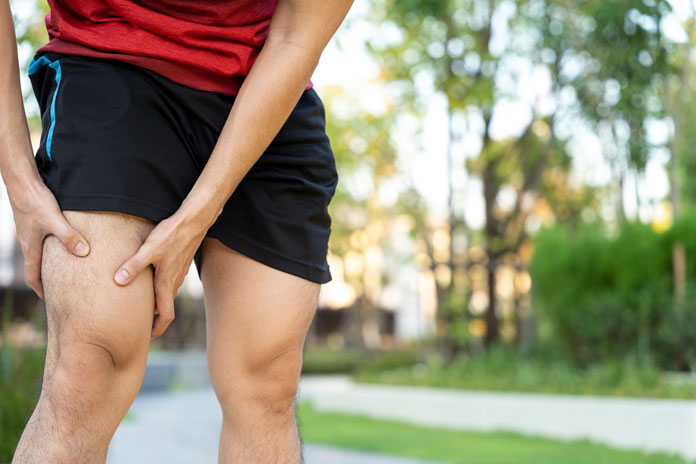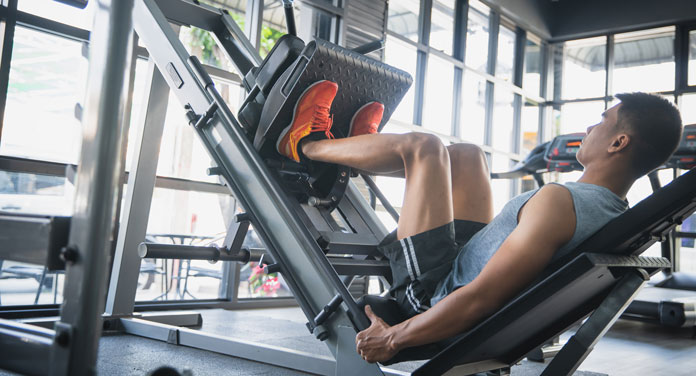What Is Muscle Twitching? Muscle twitches are caused by a sudden contraction of certain muscle fibers. This twitching is also known as fasciculation.
Muscle twitches often begin with a throbbing sensation. The twitching can occur in a wide variety of muscles. The cause of the sudden twitching is usually harmless.
What Are Muscle Twitches?
Muscle twitches are lightning-like and mostly arrhythmic contractions of the most diverse muscle bundles. Muscle bundles are called fascicles. Muscle twitches are divided into benign and pathological twitches.
Benign twitches are often caused by physical or nervous strain or stress. But a nutrient deficiency or medication can also be the trigger for these muscle spasms. The twitches primarily occur in the area of the eyes, in the upper arm muscles, or in the calves.
Pathological fasciculation is damage to nerve cells. This type of muscle twitching is common in people with ALS. If the muscle twitching lasts longer than two or three weeks, you should see your GP. They can refer you to a neurologist to find out the cause of the muscle twitching.
Causes Of Muscle Twitching
When you are under a lot of stress, muscle twitching can occur. Stress at work, school, or university is one of the main causes of sudden twitching. But they can also occur with psychological problems. If the brain is overloaded by an increased stress level, it can happen that certain muscle groups contract. The overloading of the brain results in unwanted stimulus transmission, which occurs in the form of muscle twitching.
Another reason for muscle twitching can be a lack of electrolytes. Above all, you should make sure that you are getting enough magnesium and calcium. Deficiency symptoms often result in disturbances in muscle activity. It is therefore advisable that you always supply yourself with sufficient minerals. The electrolytes in the body water transmit the nerve signals directly to the muscle cells. This causes the muscles to contract and then relax. If your electrolyte balance is disturbed, these impulses can no longer be passed on correctly.
Muscle Twitches Due To Lack Of Fluids And Exercise
A lack of liquid always ensures that the supply of nutrients to the muscles is prevented. You should therefore always make sure that you drink enough water. Otherwise, you may find that your blood thickens as a result of dehydration. As a result, the nutrients can no longer easily reach the muscle cells. As a result, the muscle cells are impaired in their function and muscle twitching occurs.
Another cause of muscle twitching can be a lack of exercise. Therefore, always make sure that you move enough. If you have to work on the PC for a longer period of time, you should take regular breaks and move around. Adjusting the desk to a standing position can also sometimes help. Lack of exercise lowers blood pressure. Thus, the muscles are undersupplied. In this case, many people react with muscle twitching.
Avoid Drinking Too Much Coffee And Alcohol
In addition to stress, lack of exercise, and high mental stress, alcohol and caffeine can also cause muscle twitching. Both stimulants are stimulating substances that can lead to impulse short circuits in the muscles. The result is uncontrolled twitching muscles. If you’ve had a history of severe muscle spasms, limit your alcohol and coffee consumption. If the symptoms no longer occur, you have found the cause of your muscle twitching.
In addition, you should take a closer look at your posture. Poor posture can be just as much a trigger for muscle twitching as lack of exercise. In everyday life, you can ensure that muscle spasms are alleviated or completely avoided in a variety of ways. Always make sure that your intervertebral disc is regularly supplied with nutrients. This is particularly important if your spine is under a lot of strain during sports or at work.
When Should You See A Doctor?

A muscle twitch isn’t just a nuisance. Your body is alerting you to an imbalance. If you only experience a slight muscle tremor every now and then, you don’t have to worry just yet. However, if the twitching occurs regularly or it always takes a long time for your muscles to calm down, you should make an appointment with your family doctor.
The same applies if you experience regular leg pain, numbness, or tingling in your arms or legs. Only the doctor can determine if there is a neurological reason for your muscle spasms. The specialist doctor can use an EMG (electromyography) to determine the fasciculation potential.
How Can You Avoid Muscle Twitches In The Future?
A balanced diet is important so that your muscles are well supplied with blood and nutrients. You should make sure you have enough minerals and vitamins in your diet. You should avoid frequent consumption of stimulants such as caffeine or alcohol.
You should also pay attention to colorings or preservatives as well as excessive salt or sugar if you do not want to suffer from muscle twitching in the future. Of course, you can also eat fast food from time to time. In general, however, you should make sure that you consume enough minerals and vitamins every day.
Which Foods Should Not Be Missing From Your Menu?
Calcium is primarily found in dairy products, almonds, cheese, kale, eggs, berries, and green vegetables. On the other hand, you can avoid a magnesium deficiency by regularly consuming bananas, legumes, nuts, flaxseed, raspberries, and whole-grain products.
Potassium is also an important nutrient. It is found in legumes, salmon, amaranth, spinach, and salmon. You can put together your menu accordingly so that your body is sufficiently supplied with all the important nutrients every day. Always make sure that you are drinking enough liquid.
Stay Active
There’s nothing like getting enough exercise. This not only gets your circulation going but also ensures better blood circulation. Regular exercise will also make you feel fitter. Another positive effect is that the nutrients from the blood reach the muscles faster.
If you sit for a long period of time, your legs don’t get as good blood flow. If you have to sit for a longer period of time at work or at school, you should compensate with optimal training. Also, make sure you maintain good posture during the day. This supports your spine and also prevents muscle spasms.





